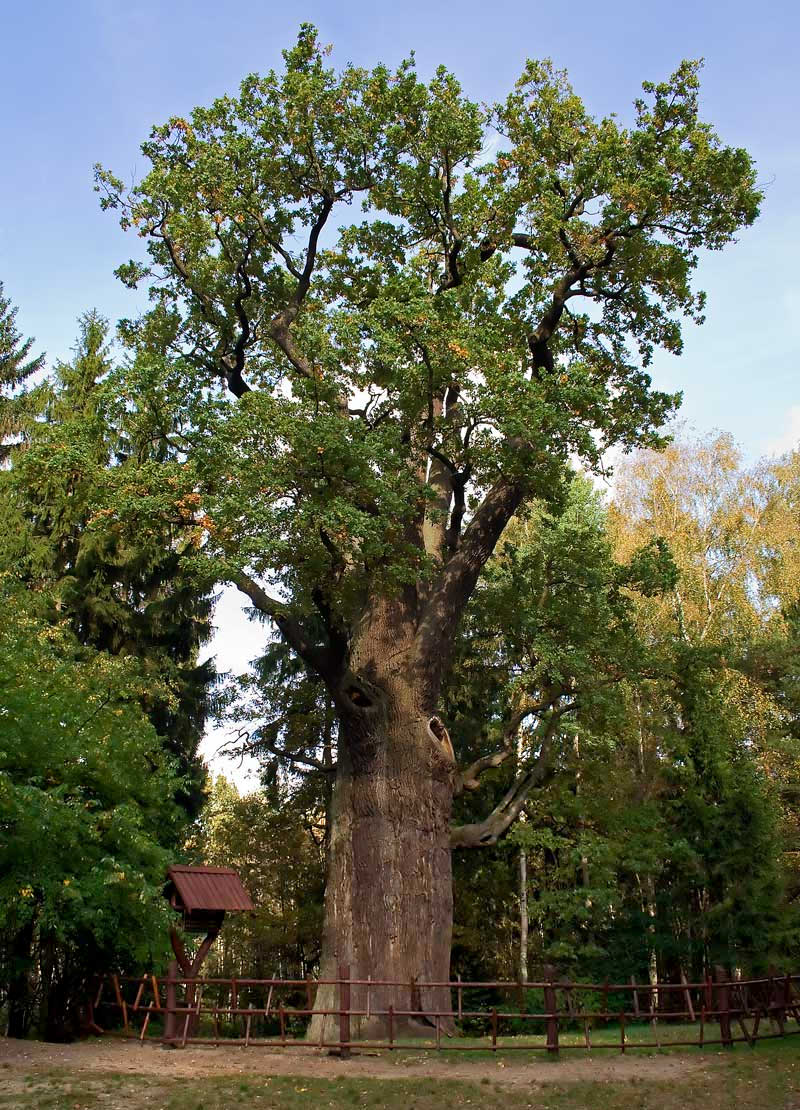Poland’s oldest oak tree, which at around 750 years old was also one of the oldest trees in the country, has died.
The tree in the Szprotawa forest district of Lubuskie Province had lived through the invasions of Teutonic Knights and Mongols, the partitions of Poland, and two world wars. But its condition had been deteriorating since it was damaged in an arson attack six years ago.
This year, for the first time in 750 years, it did not sprout any new leaves, and has therefore been declared dead, reports Polsat News.
The tree was affectionately known as “Chrobry” in honour of Polish ruler Bolesław the Brave (Bolesław Chrobry in Polish), the first king of Poland. The moniker stemmed from a fabled meeting that was supposed to have taken place under its branches between Bolesław and the Holy Roman Emperor Otto III around the year 1000, according to RMF FM.

The Chrobry Oak in 2007 (Skarabeus/Wikimedia Commons, under CC BY-SA 3.0)
Foresters estimate, however, that the tree was slightly younger, and instead began to germinate around 1250 – during the rule of Bolesław the Chaste as High Duke of Poland. Ten years earlier, the first of three Mongol invasions of Poland had taken place, which resulted in the sack of Kraków.
The tree began to grow during the time of the Seventh Crusade, led by Louis IX of France, whilst in England Henry III was on the throne. Only 35 years earlier, his father, King John, had signed Magna Carta, one of the most important legal documents in British history. At around the same time, Thomas Aquinas was also writing his first works.
The tree eventually grew to a height of 28 metres, with a circumference of over ten metres. Before World War II, the tree was situated in what was then Germany, where it was known as the “Big Oak”. Lubuskie became part of Poland after 1945, and the tree was protected as a natural monument in 1966.
It has since become a well-known Polish oak and, according to state broadcaster TVP, foresters have even found letters addressed to the tree left next to its fence. But in recent years, the tree faced its fair share of crises that threatened its survival.
Michalina Biernat from the Szprotawa forest district told Polsat that “oaks are famous for being able to survive a lot. However, Chrobry experienced even more. It survived many wars and several fires. The most serious of them took place in 2014 and was the result of arson.”
The 2014 fire was started in the tree’s rotten trunk, with flames quickly spreading to the outside of the trunk. Despite the efforts of firefighters, much of the tree was destroyed in the fire, and as a result of the arson damage, it only grew leaves on a quarter of its branches the following year. The culprit of the fire has never been found.
In other news today, it is reported that a 750-year old oak named "Chrobry" (after Poland's first king from the 11th c) finally succumbed to damage inflicted by arson in 2014. The oak didn't grow any new leaves this year.https://t.co/aGfpFuq1U9
— Wojciech Kość (@WojciechKosc) May 19, 2020
Since the arson attack, the Szprotawa forest district has been working to improve the tree’s condition, particularly as it has faced further natural damage. Over the last few years, the tree has been watered to alleviate the damage caused by the drought conditions in Poland. During one season, 4,500 cubic metres of water was used, according to TVP.
Though the tree has now died, it will not be removed from its position. The previous conservation work has also ensured it will live on in some form: shoots have been taken from the oak in recent years, which allowed its vegetative reproduction whilst maintaining 100% of the genetic material. Six of these cuttings were planted last year near the tree.
In 2004, acorns from the tree were blessed by Pope John Paul II, after a foresters’ pilgrimage to the Vatican. The oaks which have grown from these acorns are called papal oaks, with around 400 now growing throughout Poland.
In 2016, the “Bolesław” oak, which at the age of 800 was considered to be the oldest oak in Poland, fell during a strong gale. The tree had grown in a forest near Kołobrzeg and was 32 metres tall.
Main image credit: Wikimedia/rem49 (under CC BY 3.0)

Juliette Bretan is a freelance journalist covering Polish and Eastern European current affairs and culture. Her work has featured on the BBC World Service, and in CityMetric, The Independent, Ozy, New Eastern Europe and Culture.pl.




















